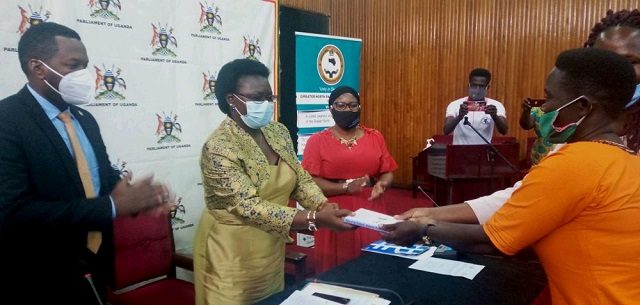
Kampala, Uganda | THE INDEPENDENT | A database of formerly abducted women and children born in captivity has been compiled to ease creation of assistance programs towards victims’ wellbeing.
The database which is a compilation of victims from Acholi sub-region was handed over by representatives of civil society, victims and UN Women at a function held at Parliament on Friday. The data base has a total of 3,420 victims.
The database was a result of a programme on enhancing gender, justice, redress and accountability for war time violations in Uganda.
The programme was executed by United Nations -UN women in partnership with the Uganda Association of Women Lawyers-FIDA Uganda and the Greater North Parliamentary Forum.
This followed a motion tabled in February 2019 by the Gulu Municipality MP Lyandro Komakech appealing for support to the formerly abducted women, girls and children born in captivity among the Lord’s Resistance Army (LRA).
Komakech urged the government to support former female abductees and children born in captivity during the LRA insurgency saying that many of the former abductees require specialized intervention because they suffered tremendous psychological and physical torture.
Yusurah Nagujja, a programme specialist at UN Women and the focal person on the programme for women, peace, security and humanitarian action observes that during the LRA insurgency, women and girls were specifically targeted leading to abductions, murders and rape which left a devastating impact on the population.
She asserts that lack of transitional justice including reconciliation and repatriation has remained a serious challenge with little accountability for the atrocities committed.
The representatives of the formerly abducted women and children born in captivity have now launched a fresh appeal for assistance from the government now that the database has been complied to effectively verify victims and specific challenges faced.
Collins Muttu Atiko, the chief of Patiko chiefdom has noted that for over 10 years, there has been a lot of talk but no action towards helping the suffering victims, he states that there is need for a paradigm shift in how the victims are given redress.
Stella Lanam, one of the victims says that many of the victims are committing suicide because of the harsh suffering they are going through.
She notes that most victims are landless with nowhere to go and nowhere to find food with the situation exacerbated by the COVID-19 pandemic.
Grace Freedom Kwiyucwiny, the Minister of State in charge of Northern Uganda blamed the local governments for not considering the victims in their planning and budgeting processes.
She recommends that the database be presented to the district leaders like the LCV chairperson and Chief Administrative officers in Acholi sub-region because they are the actors involved in planning.
*****
URN
 The Independent Uganda: You get the Truth we Pay the Price
The Independent Uganda: You get the Truth we Pay the Price



